
Marvin Pentz Gaye Jr. was an American soul and R&B singer, songwriter, and musician. He helped shape the sound of Motown in the 1960s, first as an in-house session player and later as a solo artist with a string of successes, which earned him the nicknames "Prince of Motown" and "Prince of Soul".

What's Going On is the eleventh studio album by American soul singer Marvin Gaye. It was released on May 21, 1971, by the Motown Records subsidiary label Tamla. Recorded between 1970 and 1971 in sessions at Hitsville U.S.A., Golden World, United Sound Studios in Detroit, and at The Sound Factory in West Hollywood, California, it was Gaye's first album to credit him as producer and to credit Motown's in-house session musicians, known as the Funk Brothers.
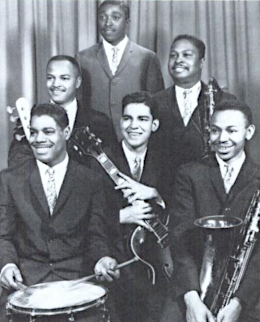
The Funk Brothers were a group of Detroit-based session musicians who performed the backing to most Motown recordings from 1959 until the company moved to Los Angeles in 1972.

Easy is an album recorded by Marvin Gaye and Tammi Terrell, and released by Motown Records on September 16, 1969 under the Tamla Records label. One song on the album, "Good Lovin' Ain't Easy To Come By", was a hit single and remains popular to this day.

Let's Get It On is the thirteenth studio album by the American soul singer, songwriter, and producer Marvin Gaye. It was released on August 28, 1973, by the Motown subsidiary label Tamla Records on LP.
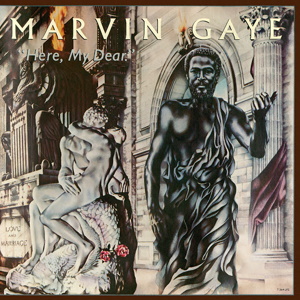
Here, My Dear is the fifteenth studio album by music artist Marvin Gaye, released as a double album on December 15, 1978, on Motown-subsidiary label Tamla Records. Recording sessions for the album took place between 1977 and 1978 at Gaye's personal studios, Marvin Gaye Studios, in Los Angeles, California. The album was notable for its subject matter focusing largely on Gaye's acrimonious divorce from his first wife, Anna Gordy Gaye.
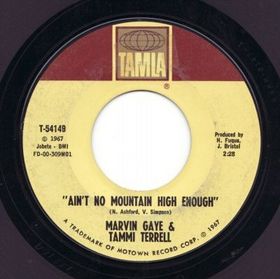
"Ain't No Mountain High Enough" is a song written by Nickolas Ashford & Valerie Simpson in 1966 for the Tamla label, a division of Motown. The composition was first successful as a 1967 hit single recorded by Marvin Gaye and Tammi Terrell, and became a hit again in 1970 when recorded by former Supremes frontwoman Diana Ross. The song became Ross's first solo number-one hit on the Billboard Hot 100 chart and was nominated for the Grammy Award for Best Female Pop Vocal Performance.

"Distant Lover" is the sixth song issued on singer Marvin Gaye's 1973 album, Let's Get It On and the B-side of the second single from that album, "Come Get to This". A live recording was issued as a single in 1974. The live version of the song was Gaye's most successful single during the three-year gap between Let's Get It On and his following 1976 album, I Want You.

Midnight Love is the seventeenth studio album by Marvin Gaye and the final album to be released during his lifetime. He signed with the label Columbia in March 1982 following his exit from Motown. Technically, it would be Marvin Gaye’s last album before his tragic death in April 1984, a day before his 45th birthday.
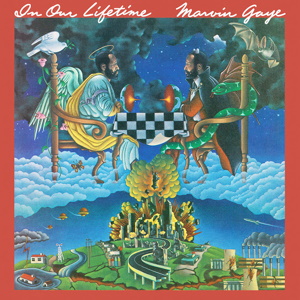
In Our Lifetime? is the sixteenth studio album by soul musician Marvin Gaye, released January 15, 1981, on Motown label Tamla Records. Recording sessions for the album took place at Marvin's Room in Los Angeles, California, Seawest Recording Studio in Honolulu, Hawaii, and at Odyssey Studios in London, England, throughout 1979 and 1980. The album cover was designed by Neil Breeden. Gaye's final album for Motown before leaving for Columbia Records, the album was the follow-up to the commercial failure of Here, My Dear, a double album which chronicled the singer's divorce from Anna Gordy. Entirely written, produced, arranged, and mixed by Gaye, In Our Lifetime? was a departure for Gaye from the disco stylings of his previous two studio efforts and was seen as one of the best albums of the singer's late-Motown period.

Diana & Marvin is a duets album by American soul musicians Diana Ross and Marvin Gaye, released October 26, 1973 on Motown. Recording sessions for the album took place between 1971 and 1973 at Motown Recording Studios in Hollywood, California. Gaye and Ross were widely recognized at the time as two of the top pop music performers.

"After the Dance" is a slow jam recorded by singer Marvin Gaye and released as the second single off Gaye's 1976 hit album I Want You. Though it received modest success, the song was widely considered to be one of Gaye's best ballads and served as part of the template for quiet storm and urban contemporary ballads that came afterwards.

Live at the London Palladium is a live double album by soul musician Marvin Gaye, released March 15, 1977, on Tamla Records. Recording sessions took place live at several concerts at the London Palladium in London, England, in October 1976, with the exception of the hit single "Got to Give It Up", which was recorded at Gaye's Los Angeles studio Marvin's Room on January 31, 1977. Live at the London Palladium features intimate performances by Gaye of many of his career highlights, including early hits for Motown and recent material from his previous three studio albums. As with his previous live album, Marvin Gaye Live!, production of the record was handled entirely by Gaye, except for the studio portion, "Got to Give It Up", which was managed by Art Stewart.
"Praise" is a 1981 gospel-inspired disco number released by American soul singer Marvin Gaye. The song, written by Gaye, is a tribute to not only his church upbringing but also to the sound of then-label mate Stevie Wonder, who is given a shout out on the song by Gaye. In the song, he persuades a lady to be positive in difficult times and let her "love come shining through". He then moves forward to praise God, similar to how a preacher would recite such passages from The Bible.

Dream of a Lifetime is the eighteenth and first posthumously released studio album by the American recording artist Marvin Gaye. It included the top five R&B single "Sanctified Lady".

Where I'm Coming From is the 13th studio album by Stevie Wonder. The album was released by Motown Records on April 9, 1971, and peaked on the Billboard Pop Albums at No. 62, and on the Billboard R&B Albums Chart at No. 7. All nine songs were written by Wonder and Motown singer-songwriter Syreeta Wright, Wonder's first wife. It was the last album produced under his first contract with Motown Records. Including live albums, this is Wonder's fifteenth album overall, and thirteenth studio album.

Vulnerable is the third posthumous album by Marvin Gaye. Recorded in sessions throughout 1977, the album was a decade in the making, first being worked on in 1968 during sessions in New York with Bobby Scott. Reworked by Gaye a decade later, the album was originally going to be released in 1979 under the title, The Ballads, but was shelved. Two decades later, Motown released it under the title Vulnerable, including seven songs from the sessions and three alternate cuts.
"My Love is Waiting" is a 1982 R&B/Soul song written by musician Gordon Banks and recorded and released by American singer Marvin Gaye, as a European-only single in early 1983, it was also the last track on Gaye's final album in his lifetime, Midnight Love; released in 1982.
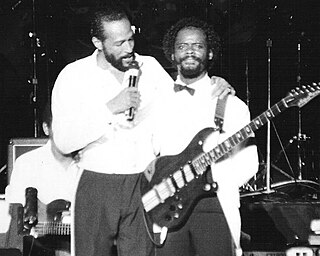
Gordon Banks was an American guitarist, producer, writer and musical director. He was voted one of the top 100 guitarists in America by Rolling Stone magazine in 1985.
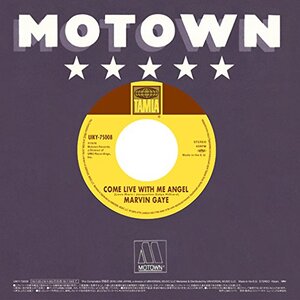
"Come Live with Me Angel" is a smooth soul song by soul singer Marvin Gaye. The song was co-written by singer-songwriter Leon Ware and lyricist Jacqueline Dalya-Hilliard for the former's album Musical Massage. However, Ware gave it to Gaye as he showed interest in it, as well as the other songs Ware had written with Arthur Ross. The song first appeared on Gaye's album I Want You as the second track.

















